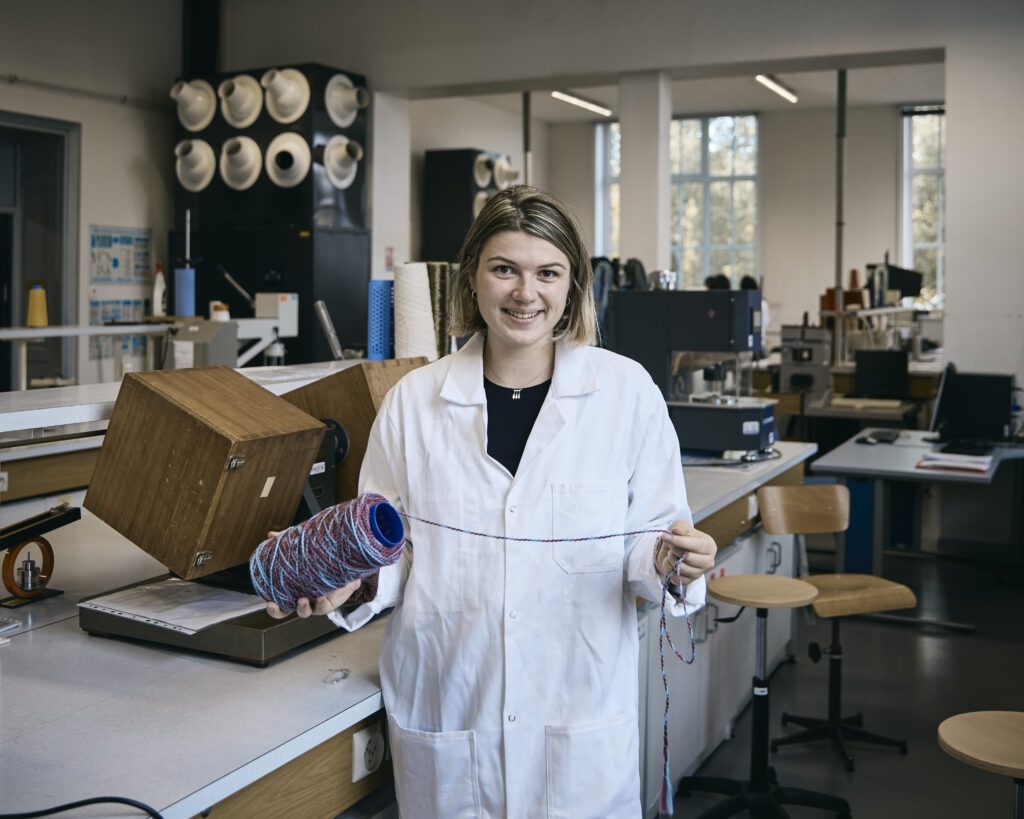ENSAIT engineering training
WORK-study program
ENSAIT’s apprenticeship textile engineering programme combines theory and practice to train qualified professionals to meet the needs of the textile industry. Students benefit from theoretical courses, practical laboratory work and professional projects in collaboration with partner companies, while being supervised by an experienced teaching team. This course offers a wide range of career opportunities in the textile industry and related sectors, thanks to a teaching approach that is adapted to the realities of the job market.
formation ingénieur ENSAIT
apprentissage
La formation d’ingénieur textile par apprentissage à l’ENSAIT combine théorie et pratique pour former des professionnels qualifiés répondant aux besoins de l’industrie textile. Les étudiants bénéficient de cours théoriques, de travaux pratiques en laboratoire et de projets professionnels en collaboration avec des entreprises partenaires, tout en étant encadrés par une équipe pédagogique expérimentée. Cette formation offre des débouchés variés dans l’industrie textile et ses secteurs connexes, grâce à une approche pédagogique adaptée aux réalités du marché du travail.
Presentation
Campus
Roubaix (France)
Alternating work-study periods
Basic training
Accreditation
Commission des titres d'ingénieur
Certification RNCP
Admission level
Bac +2 in science and/or technology
Duration of studies
3 years
Degree obtained
ENSAIT engineer
Master's degree (Bac +5)
Places available
at the start of the 2025 academic year
for 42 people

By opting for our apprenticeship-based engineering programme, you’re choosing immersive training in the textile industry. Discover the many textile career opportunities available to you while benefiting from enriching practical experience.
At ENSAIT, we are training the next generation of textile engineers through an innovative teaching approach. Take up the challenge of an excellent education while gaining hands-on professional experience. Become a skilled professional, ready to innovate in the dynamic world of textile engineering.
The specific skills of ENSAIT engineers
- Recognise basic textile processes and situate them in the textile production chain (players, materials, relative costs).
- Recognise basic textile structures, their treatment and assembly, differentiate and classify them.
- Know, measure and characterise the properties of basic textiles.
- Define the requirements for reproducing a basic textile product
- Analyse an existing product and describe all the stages involved in its manufacture
- Relate basic textile properties to their structure and/or process and vice versa. Example: choose the right materials according to the properties required.
- Link textile products and processes to their context of application (functional specifications).
- Integrate eco-design
The benefits of work-linked training
LES + DE L'APPRENTISSAGE
Financial independence
All apprentices are paid a percentage of the minimum wage (SMIC) or the minimum collective bargaining agreement, depending on their age and year of training.
Valuation of 3 years' professional experience
Apprentices alternate between 5 weeks in a company and 5 weeks of training at ENSAIT. They acquire responsibilities as the years go by.
A network that supports
Access to apprenticeship vacancies posted by our partner companies
Guidance and advice on CVs, covering letters and interviews
Developing culture internationally
8 weeks in an international company + 4 weeks in England at a language centre
Salary of an ENSAIT apprentice
It is calculated as a percentage of the SMIC or the SMC (Salaire Minimum Conventionnel) if the latter is more favourable. It varies according to age and progression through the apprenticeship training cycle (unless the collective agreement is more favourable).
Salary varies according to age and length of contract:
| Length of contract | Age 18-20 | Age 21-25 | 26 and over |
|---|---|---|---|
| 1st year | 43% of the minimum wage (SMIC) | 53% of the minimum wage* (SMIC) | 100% of the minimum wage* (SMIC) |
| 2nd year | 51% of the minimum wage (SMIC) | 61% of the minimum wage* (SMIC) | 100% of the minimum wage* (SMIC) |
| 3rd year | 67% of the minimum wage | 78% of the minimum wage* (SMIC) | 100% of the minimum wage* (SMIC) |
* or the agreed minimum wage for the job, whichever is more favourable.
The collective agreement applied in the company or the agreement between the parties may contain more favourable provisions in terms of pay.
To carry out an assisted simulation of the calculation of the legal remuneration, consult the work-linked training portal:
Employment contracts
The contract alternates periods of academic, technological and vocational training at the apprentice training center (CFA) with periods of work experience at the company, applying the knowledge acquired at school.
The contract is signed for the duration of the three-year training cycle. It can begin three months before the start of the course and end two months after the end of the course, but never before July 1.
It is accompanied by a compulsory training agreement, which enables your OPCO to cover the cost of the training.
The trial period
The trial period lasts for 45 consecutive or non-consecutive days of on-the-job training by the apprentice. If the apprentice is absent due to illness during the probationary period, the probationary period is extended by the number of days the apprentice is off sick. It is non-renewable.
The apprentice’s salary
Apprentice wages are calculated as a percentage of the minimum wage (SMIC) or the minimum wage agreement (SMC), whichever is more favorable. It varies according to age and progression through the apprenticeship training cycle (unless the collective bargaining agreement is more favorable).
Translated with DeepL.com (free version)
Program
Work-study schedule: 5 weeks at ENSAIT / 5 weeks in the company
1st year
On-the-job training
31 weeks
- Mission : Technician
- Organisation
- Engineering know-how
- Teamwork
Training at ENSAIT
22 weeks
- Engineering sciences
- Textile technologies
- Application to project management
- Sustainable, ethical and social development
- Management and Marketing
2nd year
On-the-job training
25 weeks
- Mission : Assistant engineer
- Adaptability
- Professional spirit
- Knowledge of company issues
- 8-week international period
Training at ENSAIT
15 weeks
- Engineering sciences
- Professional project and corporate culture
- Advanced textile technologies
- Research awareness
- 4-week language course in England
TOIEC validation 830 points
3rd year
On-the-job training
32 weeks
- Mission : Engineer - Final year project (PFE)
- Adaptability
- Professional spirit
- Knowledge of company issues
Training at ENSAIT
19 weeks
- Engineering sciences
- Business
- Textile innovation project
- Management and marketing
- Raising awareness of entrepreneurship
- Sustainable, ethical and social development
- Fashion and Services Engineering
- Technical Textile Engineering
International mobility
In line with the recommendations of the Commission des Titres d’Ingénieur (CTI), ENSAIT apprentices have the opportunity to perfect their language and professional skills abroad. During their studies, our apprentices spend 12 weeks abroad, an enriching experience that contributes to their professional development.

4 weeks of language training in England
to reinforce your command of English, an essential skill in today’s global business environment.
8 weeks in an international country as part of the apprenticeship contract
This period enables apprentices to put their knowledge into practice in an international environment as part of their company assignments.
Careers and career opportunities for ENSAIT engineers
ENSAIT’s career opportunities extend across a variety of fields and sectors including sport, luxury goods, fashion, medical, aeronautics, civil engineering and many others. In these sectors, our graduates occupy skilled engineering positions, using their technical expertise and creativity to meet the challenges and contribute to innovation in each field.




